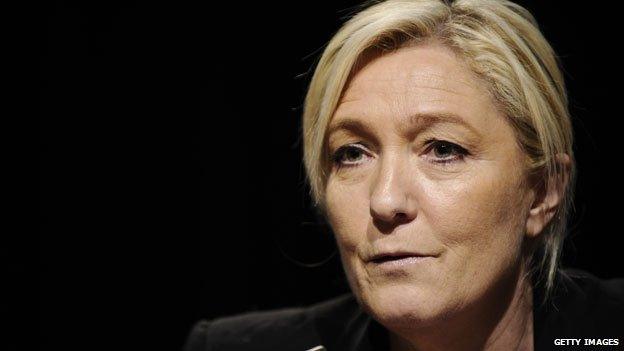The power of Le Pen
- Published
- comments

If you think growth has been pretty lousy since the crash in Britain, until the recent spurt, it may be small comfort that the UK has done well relative to the European Union as a whole.
On the basis of latest published data, the British economy is now a little bigger, 3% or 4%, than at its previous peak in 2008, whereas the EU in the round is still a bit smaller.
And in respect of what matters to most of us, jobs, the eurozone part of the EU has been a spectacular disappointment - unemployment is more than 11%, and around 23% for under 25s (compared with 5.6% and 16% in the UK on a comparable basis).
In the opening months of this year, there has been a mild recovery - though one that is halting (as industrial production figures for January show) and non-existent in the eurozone's second-biggest economy, France.
This is why millions of Europeans do not believe the EU and eurozone is serving their economic interests - and parties opposed to the EU/eurozone economic status quo are on the rise more or less everywhere.
As the tension over renegotiations of Greece's bailout show, it is the rise of populist parties of left and right that pose the greatest current threat to the survival of the euro.
By the way, entente between Syriza and Berlin appears to have evaporated already - negotiations over whether Greece will receive the additional finance it needs, and whether, therefore, the country can avoid default and will be able to remain in the euro, are again approaching a critical juncture.
All of which is a long-winded preamble to my suggestion that at 9 o'clock tonight you might want to take a short break from Comic Relief and watch my BBC Two documentary on perhaps the most important manifestation of popular discontent within the EU and eurozone, namely the rise and rise of the Front National in France (the film is called "Quelle Catastrophe! France with Robert Peston").
The film does two things - it examines why the French economy has been in the doldrums for so long, in spite of having first class infrastructure and some great businesses; and it shines a light on the phenomenon known as Marine le Pen.
Arguably, she is the most important opposition politician in Europe, who has the potential to affect the way of life of all of us.
How so?
Well her party is France's most popular. It topped the polls in last years European elections and is expected to do so again in the first round of local elections on March 22.
Also France's business and political establishment, with whom I have spent a good deal of time nattering in recent weeks, takes it for granted that she will go through to the second round of the French presidential elections in 2017 - and is not remotely confident that a centre-ground candidate of left or right will be able to rally sufficient moderate support to beat her.
So she matters, which is why I interviewed her twice for my film, once before and once after the Charlie Hebdo atrocity.
One important question is whether her repudiation of her party's racist and anti-Semitic past is more than cosmetic (she insists it is - but many argue the party's criticism of Islam is insidious).
Outside France probably what may matter most about her is that she explicitly blames the EU and eurozone for all France's economic woes.
She is in favour of French withdrawal from both, so that she can restrict immigration, impose customs duties on imports, nationalise big businesses when useful, and re-instate the French Franc.
She talks about this as "regaining our economic freedom" and the "exercise of economic patriotism".
When I put it to her that her protectionist policies were chillingly similar to those that reinforced the Great Depression of the 1930s, she said she totally disagreed and that the relevant crisis was the "eurozone that has been the black hole of world growth for 12 years".
Whether or not you think reinstating economic borders is the road to penury, it is very difficult to see how the eurozone could survive a French exit - and the economic shock of even rising fears of French withdrawal would seriously set back a European recovery (the cost of finance would rise sharply, because of the fear that converting strong euros into weak francs would generate huge losses on French assets).
None of which is to say there is a need to panic about this now.
But it does show that unless and until Europe's establishment succeeds in demonstrating that the EU and the eurozone is serving the interests of most people, which they are conspicuously failing to do at the moment, Europe's way of life will be under sustained and serious threat.